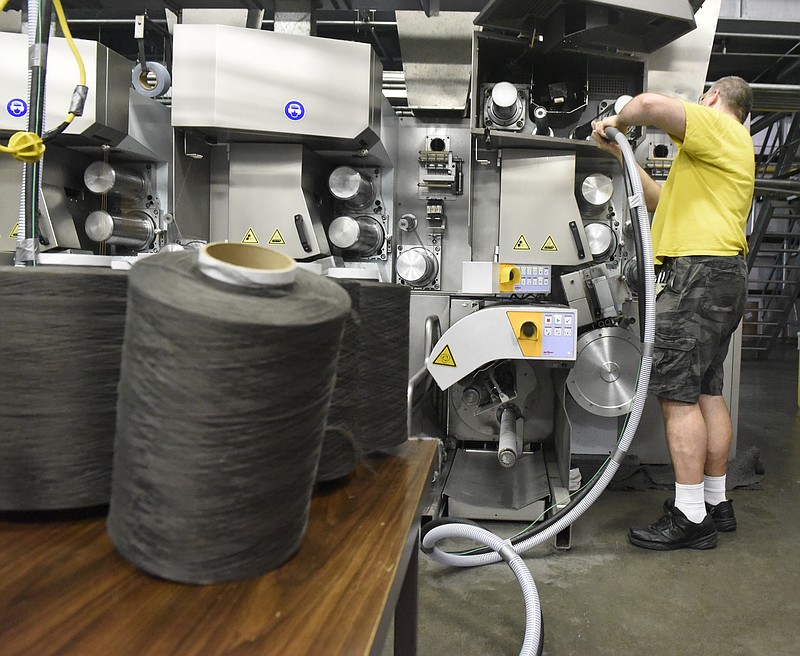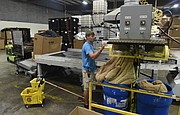DALTON, Ga. - There's a landfill in this historic carpet capital town dedicated solely to the disposal of carpet refuse. Some 100,000 to 150,000 pounds of manufacturing scraps and worn out household and commercial rugs are dumped there every day.
The carpet landfill occupies 29 acres and is estimated to be sustainable for another 10 years. Experts hope someday the site will be mined for valuable resources (like nylon) in carpets that have been dumped, covered and layered for the last 15 years.
Waste is the gorilla on the carpet industry's back. Carpet makers make the single largest contribution (around 60 percent) to local Dalton landfills, according to the Dalton-Whitfield Solid Waste Authority.
Carpet makers across the country have felt increasing pressure, from federal and state governments and from consumers, to take greater responsibility for end-of-life carpet products - to find better and more creative ways to repurpose space-hogging carpet waste and to be better stewards of the environment.
J+J Flooring Group, headquartered at its campus off Underwood Street in Dalton, accepts the challenges facing carpet makers and is blazing a trail for its colleagues to follow.
In June, J+J Flooring announced its verification as a zero waste-to-landfill manufacturer, meaning the company sends no waste - industrial or office - to landfills. The certification was verified by third-party group GreenCircle Certified, LLC.
Zero waste-to-landfill certification is an industry first in the carpet world, but officials at J+J Flooring aren't content.
Going forward, they're aiming to become a zero waste company.
the zero waste goal
David Jolly, president and CEO of J+J Flooring, said company officials took hold of the zero waste-to-landfill vision about five years ago.
"We started saying, 'What's it going to take to get as close to zero waste to the landfill?'" he said.
The company, for 20 years, had been practicing industrial waste and recycling techniques. In 1992, J+J Flooring was sending 250 pounds of waste to the landfill for every 1,000 square feet of carpet it produced.
Photo Gallery
J+J Flooring Co. in Dalton has eliminated its waste contributions to local landfillsAnd company officials say you can, too
The company built facilities at its campus to break down the trash carpet products created during production. Now, that scrap is put through an extrusion process and its valuables reintroduced into the manufacturing process - raw materials going unwasted.
But the company also set its sights on waste created in the office: bathroom waste, kitchen waste and even paper waste.
"The easy thing to do is grab [trash] and throw it in the garbage can," said Jolly.
So company officials made throwing trash away more difficult. Recycling bins were brought into the offices. Trash cans were placed farther way from employees' work spaces then replaced by recycling bins. The message to employees was clear and simple: Waste not.
The company offered to help employees learn about recycling and even to help them with recycling at home.
"We knew if you'll start doing it home, you'll do it at work," said Jolly. "Or if you'll do it at work, you'll do it at home."
He says employees took to the initiative.
"We didn't have to beat people over the head," he said.
Household-type waste now makes up around .3 percent of J+J Flooring's true waste (waste that can't be recycled). But not even that trash goes to the landfill. J+J Flooring pays to have it shipped to a waste-to-energy facility operated by Covanta, a global waste-to-energy producer.
The J+J Flooring waste is burned to create steam energy for Redstone Arsenal, a U.S. Army garrison post in Huntsville, Ala.
Commit to recycling
Of course, the recycling doesn't happen on its own.
The company ponied up funds for its long-term sustainability goals and hired a director of sustainability, Russ DeLozier.
"The company that's best with its waste is going to be the better with its resources," said DeLozier. "Period."
DeLozier studies J+J Flooring's waste streams and procedures and is charged with coming up with new, creative solutions to address them. He finds ways to save water - like the Aquafinity system, which recycles industrial waste water used in the dying process by filtering out the chemicals and dyes inserted on the pass through the system, then re-using the water for dying.
A double perk: The water only has to be heated on its first pass through the dye process, saving money on the heating and electricity bill at the end of each month - another task for the sustainability director, saving energy.
"When you're running a manufacturing facility 24/7, you consume a lot of energy," he said.
J+J Flooring employees know to turn the lights out when they're finished at a work station. Energy saved is money saved. Money saved is money earned.
"The first leg of sustainability has to be the economic leg," said DeLozier.
Down on the production and fiber extrusion floor (where scrap yarn is made into new, reusable fibers for carpet construction), old, once-scrap yarn is sheared and broken down and fed into a mechanism that breaks the yarn into tiny nylon pellets: "the heart of carpet manufacturing," said DeLozier.
The new pellets are made into thinner-than-human-hair fibers. The fibers are fed into a machine that spins and consolidates them and turns out new spools of yarn.
These are new, raw resources, necessary for the construction of the commercial carpets that J+J Flooring makes, said DeLozier. And they've been created by breaking down existing raw resources that 20 years ago would have been trashed and wasted.
Walking the production floor, DeLozier passed a box overflowing with partially used yarn spools of all different colors. The box was marked and headed for the extrusion room.
"Twenty-four years ago," said DeLozier, "that would have been thrown away, sadly."
The long-term plan
Like most manufacturers, J+J Flooring has a 20-year plan that lays out the sustainability wish list.
* Eliminate use of landfills - check.
* Reduce water usage by 66 percent.
* Reduce energy intensity and increase use of renewable energy.
* Cut greenhouse emissions.
* Increase recycled, bio-based content in products to 33 percent (up from 25 percent now).
Company leaders are happy with progress so far. Zero waste-to-landfill is ahead of schedule. With other initiatives, the company is behind.
But Jolly hopes that J+J Flooring is at least showing others that it can be done. If a 750-employee carpet manufacturer can eliminate its landfill contribution, individuals and families can, too.
"You can do it if you commit to yourself," Jolly said. "Landfills are wasted space - wasted everything."
Contact staff writer Alex Green at agreen@timesfreepress.com or 423-757-6480.

